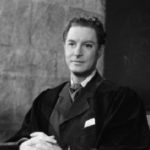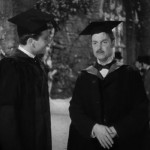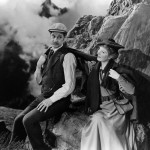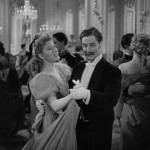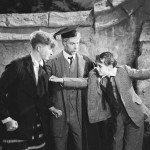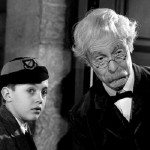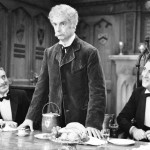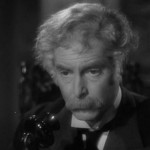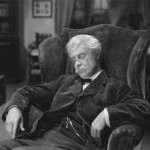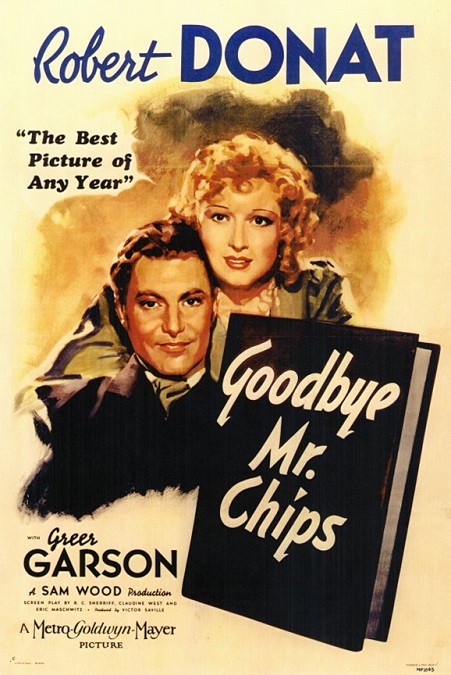
Goodbye Mr. Chips – 1939
Awww… Aren’t old people remembering their pasts sweet? The answer is no. No, they are not. At least not for their own sakes. If you want a particular man to be thought of as sweet, then show me why I should think so. Why should I feel my heart strings being tugged at when he sees a young child smiling at him?
Yes, I know I am being slightly harsh, but therein lies my biggest problem with Goodbye Mr. Chips. Mr. Chipping, played by Robert Donat, is a Latin teacher, or Master, at an all boy’s academy in England. His career as an educator begins in an unmemorable fashion. It continues in an uninteresting way. And in the end, he has somehow earned the love and respect of students and teachers alike simply because he has been faithfully doing his unremarkable job for so long.
The film was as slow and unexciting as Mr. Chips himself. I think that the point was that he was supposed to be such a great teacher that he eventually becomes the best headmaster the school has ever had. The students are supposed to love him because he cares so much about the children he is inspiring and educating. The staff are supposed to respect him because he has gone out of his way to do an exemplary job as a Master.
The trouble is that the film didn’t spend nearly enough time establishing these things. There were a few scenes in which he is shown teaching in the classroom, but he wasn’t doing anything unusual or creative with his students. He was only shown sitting at his desk and telling students to translate Latin from a textbook.
The most interesting part of the film was how Mr. Chipping met his wife. He was pressed into going on holiday with a fellow Master. While hiking alone in the mountains of Austria, he meets another lone climber, Kathy Ellis, played by Greer Garson. They are stuck on the rocky cliffs together by a blanket of fog, during which time, they fall in love. The two are parted, but meet again in Vienna. After that, they are soon married.
But then the pace slows again as Mr. Chipping, or as his new wife calls him, Chips, returns to his teaching job. Mrs. Chips is unfortunately not around for long as she and her baby both die in childbirth, making the film take another slow turn. The pace is almost saved by World War I, but not quite. The film slows down again as the entire school mourns the loss of teachers and alumni whose lives have been claimed by the war.
All that makes it sound like I hated the film, but I didn’t. There were a few things I liked. For example, the acting. Donat won the Academy Award for Best Actor that year, beating Clarke Gable in Gone With The Wind. It was a well-deserved win. The character of Mr. Chips started out as a 25 year-old man and ended up as an 83 year-old. Donat convincing portrayed all the ages in-between with what seemed like ease.
Second, I thought it interesting how several generations of a single family were all played by a single child actor, Terry Kilburn. He actually played John Colley and Peter Colley I, II, and III. Kilburn is probably best known for playing Tiny Tim in the 1938 adaptation of A Christmas Carol. And third, one thing was done that I actually really liked. As the names of the fallen school alumni were being read, they made a point of naming one who had actually fought for the Germans with just as much sorrow and respect as had been given the Englishmen.
And in the end, the film was about nothing more than Mr. Chips as he remembered his past, thinking that his life had been a good one. He was happy because he was a well-respected man who’d never had children of his own, but that was alright because he’d had thousands of young boys over his 58 year career. They were all his children, in a way. His was a life of which anyone could be proud.
But I don’t get it, though. His happiness was not as poignant as it should have been because he didn’t really do anything significant other than teaching for a very, very long time. Unfortunately, the filmmakers relied on that just to say “Awww… Aren’t old people remembering their pasts sweet?” The answer is no. No, they are not.
